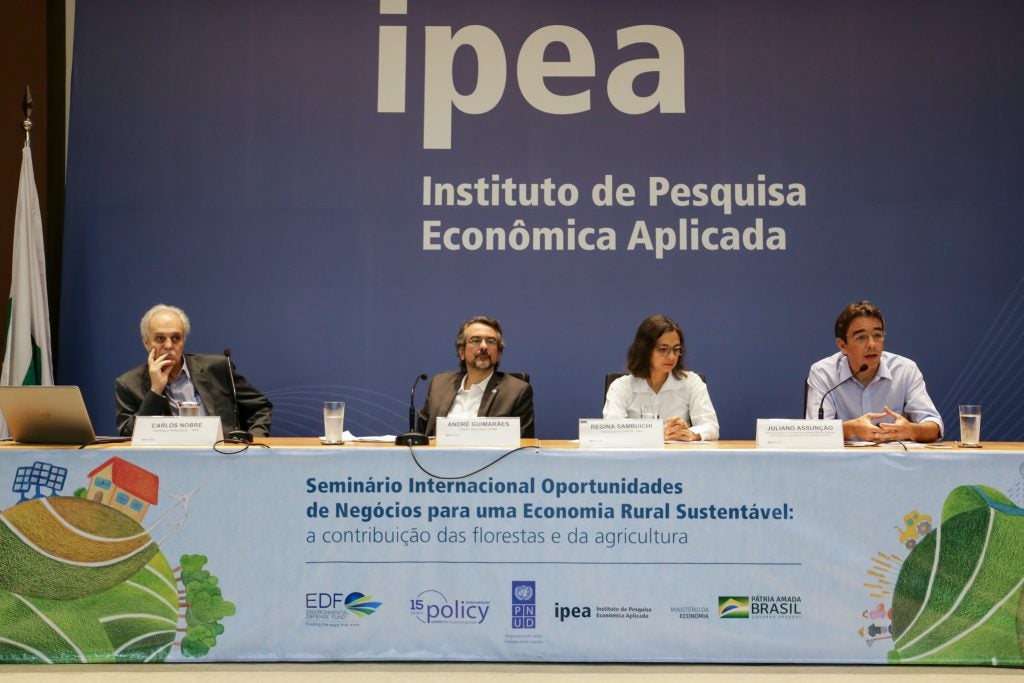
Day one panel “How should the rural economy be in the future?” featuring, from left, Carlos Nobre (IEA-USP), André Guimarães (IPAM), Regina Sambuichi (Ipea), and Juliano Assunção (PUC-RIO). Photo by IPC-IG on Flickr .
The recent fires in the Amazon rainforest have raised the question: is it possible to have a new model of development in the region that reconciles forest protection with economic growth?
The pressing threats of climate change, biodiversity loss, and environmental degradation along with a growing global demand for agricultural commodities, pose major challenges and opportunities for rural economies.
A group of Brazilian and international scientists, economists, and government officials joined private sector, civil society and multilateral organization representatives in Brasília to discuss how these challenges could be turned into economic and environmental opportunities for the Brazilian rural sector.
The two day workshop, “Business Opportunities for a Sustainable Rural Economy: The Contribution from Forests and Agriculture,” examined different facets of Brazil’s potential in a low-carbon rural economy. Organized by Environmental Defense Fund (EDF) in partnership with the Institute for Applied Economic Research (Ipea) of the Brazilian Ministry of Economy, and the United Nations Development Program – International Policy Centre for Inclusive Growth (IPC-IG), participants concluded that Brazil has an unparalleled comparative advantage to foster a buoyant sustainable rural economy that couples economic and agricultural development with environmental protection.
Panelists discussed potential business opportunities that Brazil can develop from emerging carbon markets and their limitations; sustainable supply chains; and novel multilateral investments linked to environmental outcomes. Specifically:
- As international cooperation for the mitigation of climate change develops under the Paris agreement, and as voluntary and mandatory demand for emissions reductions expands worldwide, the workshop debated if—and how—Brazil can fruitfully engage these markets.
- Major international companies are increasingly committed to eliminating deforestation from their supply chains and sourcing agricultural commodities, wood products, and biofuels from areas that meet those requirements. Participants discussed how the country could position itself as a sustainable and preferential sourcing region.
- Multilateral investments have already been deployed in Brazil, and other countries, as a compensation for climate change mitigation via reductions in deforestation. The seminar discussed how to best scale up investments into forest conservation.
The workshop then explored how Brazil can seize these new business opportunities using and improving its existing toolbox of public policies. Panels focused on the importance of the Brazilian Forest Code, which sets mandatory native vegetation preservation requirements within rural private properties, and the nationally determined contributions (NDCs) under the Paris Agreement.
Workshop participants also considered how rural credit can leverage agricultural production and environmental protection by channeling resources to farmers in compliance with the Forest Code, and on the positive biophysical feedbacks of forest protection on agriculture, such as temperature and rainfall regulation.
The event provided a venue to examine how different pieces of the environmental protection and rural economic growth puzzle can work together, advancing the idea that Brazil has huge potential to grow economically while protecting forests and promoting a more sustainable agriculture.
The final report of the seminar is available at the links below. It contains a summary of each presentation, the link to the accompanying slides and to the recorded sessions.
One Comment
Amazon is the lungs of the earth. We must save it.